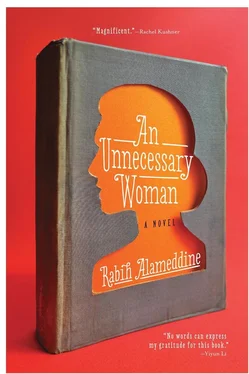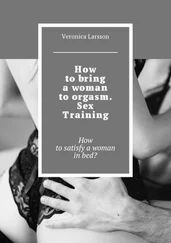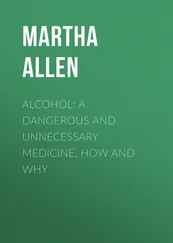She occupies the floor in the center of the room and constantly checks up on me while pretending not to. Today she doesn’t look like Pessoa’s imaginary girlfriend, Ophelia, more like the older Eudora Welty, though with dyed black hair.
“It’ll take a long time,” I say, “much too long.”
“We have the time,” Marie-Thérèse says. Kneeling, she blots her wet hands dry on the towel on the floor before her. “It’s the holidays, after all. I don’t have anything better to do.”
“If we don’t dry the pages,” Fadia says, “we’ll have fungus growing all over the place. Fungus spreads like fungus. All over the place, all over the building. I can’t have that. What if it gets under your nails? It’s highly contagious. Who knows what would happen to mine? Look, look.” Fadia’s voice hoots and shrieks as she shows us her nails. “I can’t risk structural damage to these. We need an emergency intervention.”
She does repeat her unfunny jokes, which for some strange reason sound funnier the more I hear them.
It rains and rains. My soul is damp from hearing it. It drizzles, then showers, then drizzles, then showers. The day’s sorrow is pouring itself out. The window groans from being battered. Through it, the sky seems frozen.
“I’m not sure they’re worth salvaging,” I say, returning to my chair. Standing exhausts me.
“What a silly thing to say.” Fadia shakes her head in mock disbelief. “This is a lot of paper. It can’t all be unimportant.”
She settles next to Joumana and grabs the chef’s knife from her. She, the vivisector, slices through Javier Marías, opens him up to examine his insides. Her use of the knife is more skillful, of course: she’s both a better cook than Joumana and less sensitive, less meticulous.
Marie-Thérèse begins to put up laundry lines. Her deceased husband, who was obsessed with hunting, fishing, and trawling, left behind a boatload of line spools. She strings crisscrossing clotheslines across my entire apartment, tacking them to the wall with pushpins. When I suggest that they might not hold, she reminds me that all we’re hanging are sheets of paper. Even before she finishes, I know there won’t be enough lines for my pages.
Fadia and Joumana begin to hang, sheet by sheet, in meticulous order, as Marie-Thérèse finishes stringing the lines. They use plastic clothes pegs, even paper clips. My reading room begins to brim with ghostly Tibetan prayer flags.
I want to help. I stand up again, rejoin them. I pick up a page to hang on the line. Fadia and Joumana leave a space for me, but by the time I finish they are six or seven pages ahead of me. My mind is mired in turbid swamps. I see the three witches in the room, I interact with them, but it’s as if there’s a thin layer of Saran Wrap between us — only the rare molecule passes through.
“This won’t be enough,” says Joumana, still hanging the Danilo Kiš manuscript.
“No,” says Fadia.
“We’ll need something else.”
It’s raining hard, raining harder, raining harder still, the drops like mourners goading one another into a rising frenzy of laments. It rains as if the whole world is about to collapse, as if the sky is going to plummet — Noah’s revenge upon my kind. He has finally broken through into my home.
“Where’s your blow dryer?” Fadia stands before me, a paper line between us, our faces between the pages.
“My blow dryer?” I ask. Why does she suddenly want to dry her hair? I explain that I don’t have one, that I’ve always dried my hair with a towel, that I haven’t had one since my husband left and took his with him, that it was one of his prized possessions, which didn’t make any sense because his coiffed hair was always covered by his sophomoric hat.
Suddenly garrulous me.
All three stop what they’re doing. If I’d said that I ride with the Valkyries every morning after breakfast, that I gave birth to a million jinn on the shores of the Red Sea on Sunday the twenty-second of June, that my secret lover is Zeus in the form of a shower of gold — anything but the fact that I’ve never owned a hair dryer — they would have been less surprised.
“Your hair was nice,” says Fadia. “It had so much possibility, but you never dyed it, and when you did, you had to dye it blue. I don’t understand you.”
She’s standing much too close to me. They all are. I can smell them — each wears a different cologne; Fadia also reeks of French cigarettes.
“Fadia!” her companions yell simultaneously.
“Oh, be quiet,” she tells them. Then, to me, “What was up with the blue hair? Why did you do that?”
“It was an error in judgment,” I say.
“It was certainly that.” Fadia waves her hand to signal her co-witches that they should not interrupt her. She knows when they’re about to meddle in her meddling. “And why in the name of all that’s holy did you shear off your hair? Couldn’t you have gone to a salon and had it fixed? A little coloring and brushing and you’d have felt like a new woman. You look like a nun without her habit, and not the pretty one, not Audrey Hepburn, more Shirley MacLaine.”
“Fadia!” her companions cry.
“How can you say such a thing?” Marie-Thérèse demands. She tries to pull Fadia away, but Fadia shrugs her off like someone flicking off an irritating housefly.
“She’s not Shirley MacLaine,” Joumana says. “You are. You’re just as loud and inappropriate as she is. What happened to your manners?”
“They aged,” Fadia says. “They grew old to keep me young.”
“You don’t look like Shirley MacLaine,” Marie-Thérèse tells me. She reaches out to me, her right palm cupping my left elbow.
“Well, she doesn’t look like what’s her name in Rosemary’s Baby either,” Fadia says. “That film scared me. All I have to do is think about it and I need adult diapers. Let’s not think about it. Wait, wait. Do you remember that French film with the mustached American actor who looks like a raisin left in the sun too long? The actress had short hair. Not Annie Girardot, another one.”
“Just ignore her,” Joumana tells me. “We always do. She hasn’t made any sense since 1998. That was her last good year.”
“I’ll get my hair dryer,” Marie-Thérèse says. “Maybe we should all get ours. We can dry the papers faster.”
“Something in the rain,” Fadia says. “The movie had an interesting title, but I can’t remember. It’s from the sixties. You don’t really look like her, but the French actress had very short hair.”
“Get your hair dryer,” Joumana says as she drags Fadia off by the hand.
I want to lock the door and keep all of them, the entire world, out, but the dank smells almost suffocate me. An imperious humidity hangs thick in the apartment, an oppressive tyrant. I leave the door to my home open. I let the air in. It circulates briskly in the apartment for a moment but is soon vanquished; it grows heavy and stale.
I look for Anna Karenina . Where is she? She’s all I need. I step from one coffin to another, but I don’t see her among those in the reading room. I retrace my steps just in case. I move into the kitchen. On a damp blue-striped bedsheet covering the floor, Anna’s box looks like a small, broken dwelling about to implode, like abandoned trash on the sidewalk. She’s all I need. I must inspect her.
This was one of my earliest translations, probably the third or fourth. I love Anna, but that’s not the only reason she’s important. Karenina was the first project where I began to feel I knew what I was doing. I shouldn’t say that. I’ll say it was the first translation where I didn’t feel as inadequate, where the struggle was no longer as arduous or titanic, where the translating itself became enjoyable — just as pleasurable, if not more so, than the anticipation of finishing the project. Anna Karenina was the first time I allowed a book and its world into my house.
Читать дальше












